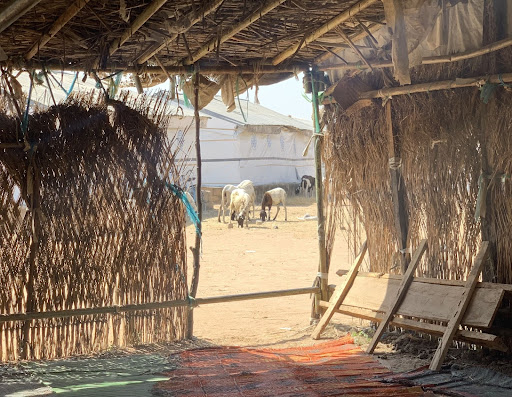People Who Fled Borno Left Out Of Adamawa Resettlement Plan
People who fled the insurgency in Borno and sought shelter in Adamawa state, northeast Nigeria, are at risk of being left back in camps while displaced persons from communities within Adamawa are moved to resettlement sites.

People who fled Borno to displacement camps in Adamawa state are at risk of being forgotten and left out of resettlement plans, it can be revealed.
Authorities administering the camps in Adamawa expect the authorities in Borno to take responsibility for their indigenes who have been housed in camps across the state border in Adamawa, some for nearly a decade.
But it is not clear that Borno has a plan to take them back. No official from Borno would speak to HumAngle on the subject, despite repeated attempts to contact them. A spokesman for the Borno State Government told HumAngle he did not realise there were people from Borno living in camps in Adamawa who had not been slated to return.
Muhammed Suleiman, the Executive Secretary of the State’s Emergency Management Agency in Adamawa (AD-SEMA) told HumAngle in a phone interview displaced people from Borno wanted to go back there.
“We conducted a return intention survey and a majority of IDPs from Borno prefer to go back home,” Suleiman said. He went to Borno to meet with the state government to make plans for Borno IDPs to return home, but the discussions did not end in any resolution.
Hopes
IDPs in Malkohi camp located in Yola, the state’s capital, told HumAngle last year they hoped to be relocated to resettlement sites that are still under construction in Labando community in Girei Local Government Area (LGA).
“No one here would tell you they are not tired of staying in this camp,” Naomi Daudu says while seated beside her makeshift tent.
Suleiman, however, reveals that arrangements are being slowed down due what he said was the Borno state government’s inaction.
“They have promised to make arrangements to come and pick their people, or they would arrange where they would settle them then the Adamawa government will take them back. We are just waiting for them, but it is becoming very difficult.”
Resettlement efforts in Adamawa.
The resettlement site in Labando is a collaborative effort between the International Organisation for Migration (IOM) and the United Nations Office for the Coordination of Humanitarian Affairs (UN OCHA). The project is intended to cater to displaced people in the state and returnees from Cameroon.
However, Suleiman tells HumAngle there are two more resettlement sites that have been constructed by the state government located in Gombi LGA and in Yola.
“The state government in conjunction with some partners have constructed 250 houses in Malkohi where they will resettle IDPs in camps and those in host communities that want to go there,” he explains.
Bleak future for Borno IDPs in Adamawa.
Camps in Adamawa state, northeast Nigeria, were initially set up to shelter those fleeing from the insurgency in Borno. The AD-SEMA set up the first camp in Madagali LGA, a community in Adamawa that borders Borno villages that came under terror attacks.
By 2014, the insurgency had spilled over into Adamawa. It affected Madagali and other communities of Adamawa that all bordered southern Borno, causing thousands of people from Adamawa to seek shelter.
According to Suleiman, there are 21 camps, and “camp-like settings”, distributed across the state but only four of them are recognised by the state government. In these state-recognised camps, 80 percent of the occupiers are from Borno, he noted.
Almost a decade later, with dwindling access to aid and shrinking humanitarian funding, the state is intending to reintegrate and relocate displaced persons in places with relatively better living conditions.
HumAngle reached out to officials of the Borno State Emergency Management Agency (BO-SEMA) via phone and email to ask about the situation. Officials insisted they could not answer unless a reporter went to their headquarters in Borno. HumAngle’s Maiduguri based-staff tried to contact Yabawa Kolo, Executive Director of Borno State Emergency Management Agency the same day, but she said she had travelled away from the office.
The Information Commissioner for the Borno State government, Babakura Abba-Jato, said: “I am aware that most of the Borno IDPs in the states sharing boundaries with Borno and those that were in refugee camps located in countries sharing borders with Borno have been evacuated and brought to their communities in Borno. But I am not aware of the ones you talked about in Malkohi camp of Adamawa state.”
The Information Commissioner said he would look into it and get back to HumAngle, but he had not yet done so at the time of publishing.
Additional reporting by Abdulkareem Haruna
Support Our Journalism
There are millions of ordinary people affected by conflict in Africa whose stories are missing in the mainstream media. HumAngle is determined to tell those challenging and under-reported stories, hoping that the people impacted by these conflicts will find the safety and security they deserve.
To ensure that we continue to provide public service coverage, we have a small favour to ask you. We want you to be part of our journalistic endeavour by contributing a token to us.
Your donation will further promote a robust, free, and independent media.
Donate HereStay Closer To The Stories That Matter




